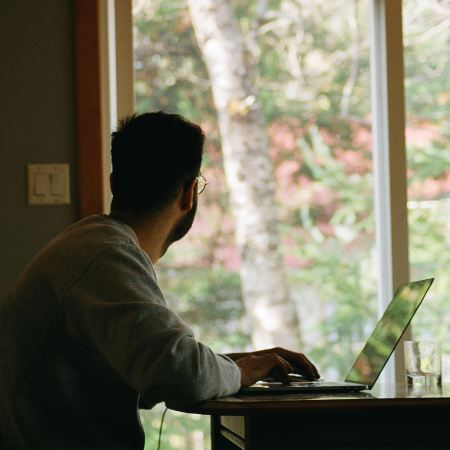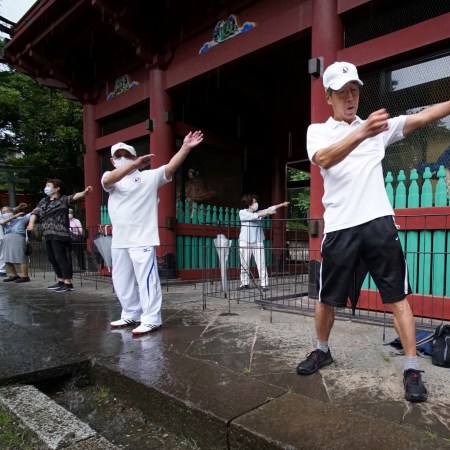“The Modified Thomas test reveals tight bilateral rectus femoris, as well as hypertonic TFL on the right side,” Jeremy Roberts, a chiropractor at Altus Health in Santa Monica, tells me. He is a tall, athletic man who sits perfectly upright on a doctor’s stool while gesturing at a report. “Basically, we did a test here that kind of shows that these are a little tight when you’re stretching them out.”
He notes the decreased ranges of motion and points to pictures of a 42-year-old man (that’d be me) lunging, his right knee and hip circled in red, indicating where they quite clearly jut out of line. “How this reads is, in the hip, your external rotation bilaterally is at 35 degrees out of 45 degrees, 45 degrees being the normal limits.” Translation: I’m tight in the hips.
We’re all tight in the hips. You’re probably sitting in a chair right now, growing tighter by the minute. As the tightness compounds and we carry little misalignments with us to the gym or a yoga class, we start to compensate for the dull pains here and there by overworking other muscle groups. As the years roll by, and the pain sits, we acclimate until what started as a small issue becomes unavoidable. Accidents happen. Injuries are sustained. An IT band needs replacing ($15K), a knee needs stem cells ($8K) or a hip needs titanium ($32K).
Altus Health ($24K/year) isn’t a chiropractic office, per se. It’s a holistic wellness practice that aims to correct bad behaviors and replace them with better ones tailored to an individual’s specific needs. The report Roberts is referencing is from an assessment I participated in a week prior to this visit, a two-hour long session that included flexibility calculations, discussions about my diet, routines and a breathless workout to test my stamina, strength and flexibility. I stood in front of a screen with a grid on it and did various movements which begot data and visual information they’ve used to deduce my range of motion, weak spots and biological age, which they determine by comparing my personal analytics against age-based benchmarks.
“Your biological age is 37, which is good,” says Roberts. Skepticism is easier in hindsight than in the face of flattery. He then adds, “But we like to get our clients 10 years younger.”
The interesting thing about pain, in all people, is that we have a short memory for it and a great ability to suppress it, which allows things to deteriorate. Nevertheless, it’s easy to look for problems with health, especially in Southern California, where personal wellness is king. If you’re feeling off, seek and you will find someone who will confirm it and offer remedies for a handsome fee.
I enter Altus Health wondering if they are one of these predatory places, but to me, their mission seems different. Altus helps folks looking for radical improvement, whether it’s from injuries caused by burnout or accidents, or from being too sedentary (80% of Americans), as well as athletes looking to excel. Their practice is part of a broader trend toward a more holistic approach to wellness, a strategy that may be too nascent to have any clinical efficacy but does merit consideration.
“We were realizing that everyone was running into the same patterns in terms of forcing themselves into a program for a while, having some success, but then reverting back to their old ways,” says Paul Vincent, co-owner of Altus. He started the business several years ago with his brother, Chris, a sports chiropractor who has been working with professional athletes and actors for over 20 years. “We started looking a little more deeply into that, and realized that there are these patterns that most people have around health and a lot of things in their life.”
These patterns extends beyond exercise to include diet and mindfulness — diet being a major component to weight, and stress being a major contributor to pretty much all maladies. The brothers Vincent also saw how people were compartmentalizing their health, going from doctor to chiropractor to various gyms and studios without a cohesive plan or strategy guiding it all. They figured they’d combine all of that into one place, allowing the various phases of a wellness routine to be tracked simultaneously and with distinct goals in mind. Through enhanced awareness, it’s easier to yield better results.
“You have a person who reads about some diet online and is piecing it together,” says Vincent. “Or you’ll see these women going to pilates or spin classes because they like doing it, or they like the instructor; they end up putting all this effort in but not getting the results they want.” The reason: our bodies acclimate. To improve your diet, you need to eat a variety of foods. To improve your fitness, you need to perform a variety of exercises.
The program at Altus varies depending on the client, but typically it’s a year-long commitment. Their goal: to give you not only the skills that you need to correct bad behaviors, but to instill muscle memory for positive habits that’ll endure, which is clinically proven. In 2009, Phillippa Lally famously found that it took a group of volunteers 60 days to fully form a new habit, from making a plan to setting an intention to constant repetition within a determined setting.
Altus takes this a step further. By constantly analyzing your biometrics, they fine-tune your workouts and diet on a weekly basis. And given that they’ve been at this for two years, they have performance data from a growing number of people to help them pinpoint the best strategies for certain types of people and bodies.
After the assessment plan is set, the program starts with 60% chiropractic work and 40% exercise. Over time that flips. They also schedule one-on-one yoga sessions and massage therapy, all done within their facilities, which is housed in an industrial block in Santa Monica but has a very zen-like vibe. The gym is simple but feature state-of-the-art equipment. They have ice baths and showers. Sessions are roughly an hour, so your schedule isn’t taxed.
My first workout consists of about 30 minutes of dynamic movements in which a trainer corrects my posture and positions. I feel the difference in my balance. After that, Adam Silver, a chiropractor, assesses my alignment and adjusts my hips, providing instantaneous relief that improves my chair stance in yoga, my stride (hiking and running) and my turf toe … all of which will revert to form a week later, once I fall out of practice.
Across town, in Hollywood, Remedy Place is now open; it’s a studio dedicated to recovery. Naturally, they’re seeing something similar. “I see a lot of people who do something like Barry’s Bootcamp, and they just get in their cars afterwards and go to work, where they’re sitting,” says Joey Cifelli, a trainer at Remedy Place. “The five-minute stretch after class is beneficial, but you should really be doing more.”
Cifelli is a professional swimmer, and like most athletes, he spends 60% of his fitness routine either warming up or cooling down, and only 40% exercising or practicing. “Spending time stretching, spending time letting the body relax after that high intensity is so important for muscle recovery,” he explains. “You just broke down all those muscles and the last thing you want to do is let everything tighten up and then go straight into a workout the next day, never having that ability to allow the body to recover.”
Remedy Place, which has soft grey Italian slate walls and is redolent of breu resin from the Amazon rainforest, offers stretch classes, meditation classes and sound baths, all of which can be purchased a la carte through their app or included in a membership ($495). On top of the guided classes, there are infrared saunas for detoxification, hyperbaric chambers for improving respiration, lymphatic drainage massage for reducing inflammation, ice baths and a state-of-the-art cryogenic chamber for enhancing circulation.
Related: Can a Booze-Free Fitness and Social Club Win Over LA’s Elite?
Jonathan Leary, another chiropractor, founded Remedy Place to fill a gap in the market. “The vision of Remedy Place and the whole birth of this was to create a platform that could be a bigger educational platform to teach people how to take care of themselves and also to fund research on what actually works,” he says.
He’s referring to functional medicine, an often criticized form of alternative medicine. “Functional medicine is basically an analysis or blueprint of the whole entire body,” he says. It’s worth noting that sometimes — particularly with autoimmune issues — medical science hits a wall, and more natural, holistic approaches may provide relief and even healing.
Both Remedy Place and Altus Health also work with dietitians who gather stool samples to analyze the microbiome of the gut. This, too, remains an inchoate field, and while it may in the future lead to some findings, currently the results need refinement.
It’s easy to scoff at clinical work’s tedious pace, but that method ensures the findings aren’t subject to common blindspots inherent in our consciousness, such as hindsight or confirmation biases, which, ironically, are the very pitfalls most of us fall into when approaching our own health.
“Our job here is to give you all the tools, a solution and a plan and to show that we love and care for you and will support you on this process,” says Leary. “But it’s up to you to make you healthy. There’s no biohacking. There are no shortcuts. You need to take care of yourself. That’s the biggest part.”
One goal of Remedy is that their “bar” — which serves herbal teas, tonics, kombuchas and Erewhon-prepared food — will serve as an alternative to traditional watering holes. Leary points out that millennials are particularly interested in sobriety as a lifestyle, and he’s right. Liquor sales have been declining for some time, and the abstinence of millennials and Gen Z is a big reason why. But people still want to go out — we’re social animals. And while his goal of improving the healthcare industry is indeed earnest and noble, he’s shrewdly positioned his business.
“This younger generation, they don’t flinch at taking care of their health,” Leary says. “They see health like they should. This is your biggest asset. If you’re going to pay for anything, your number-one thing should be your health.”
Interested in a more holistic approach to your health? Start at one of these place …
Altus Health
Altus sees several types of people: actors looking to drop weight for a movie or get back to weight after one, athletes looking to level up and/or recover, and workaholics who are either out of shape or injured from overdoing it.
Remedy Place
Remedy Place is ideal for recovery. They offer classes in meditation, stretching and breath work, with ice baths as a way to hone your mental focus and improve your circulation. This spot is also ideal for socializing, as it turns self-care into something fun in lieu of hitting a bar.
Monarch
Monarch is another new holistic gym on the Sunset Strip. Founded by Dr. Ryan Greene, an osteopathic physician, their program sets schedules for exercises and nutrition that take your physical needs into account.
This article was featured in the InsideHook LA newsletter. Sign up now for more from the Southland.























